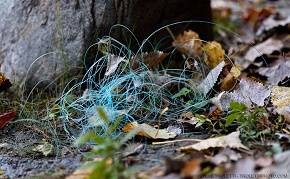FISHING LITTER: Each year, thousands of birds and wild animals get hurt or die from fishing litter. The Environment Agency deal with 3,000 injured swans annually.
UK littering laws tackle the problem of hazardous waste in the countryside and waterways. Codes of practice encourage responsible behaviour.
All anglers should avoid leaving or discarding fishing litter in the water or on land. In Britain, the RSPCA deal with the needless suffering caused by line, fish hooks, and lead weights.
Please take your fishing waste home with you!
How Does Fishing Litter Hurt Wildlife?
All kinds of littering and refuse can be harmful to domestic animals and wildlife. But this is a list of the most common fishing litter discarded by anglers in Britain and how it harms animals.
- If fishing line wraps around an animal it can cut off the blood supply to other parts of its body. Some wildlife get entangled in line resulting in starvation and a slow, painful, death.
- Animals swallow fishing hooks, catgut line, and weights. These cause internal blockages, severe injury, or poisoning, and are often fatal. Fish hooks also embed into an animal’s skin or pierce it.
- Bottles are death-traps for small creatures such as voles and mice. Glass bottles and jars also break into smaller fragments. Shards of glass can be lethal to animals, especially large mammals.
- Rubber bands, plastic pots, and cans are dangerous. Plastic beer-can rings kill large numbers of water-based animals. This includes birds floating at the surface and fish species below the water-line.
Animals Vulnerable to Fishing Litter
Swans and Cygnets
Wild birds with injuries are a common sight at rescue and wildlife centres. But injured swans and cygnets outnumber all other rescued birds.
Most swans are treated for injuries caused by angling equipment and fishing litter.
Birds and Tawny Owls
Unfortunately a tawny owl caught in fishing line is a common sight for the RSPB. The RSPCA treat 1,000s of wild birds each year resulting from fishing litter entanglement. More than half are swans.
The Environment Agency and angling organisations have produced codes of practice. The regulations aim to encourage consideration and responsibility towards littering the countryside.
The Angling Trust, the Environment Agency, and the National Swan Convention (NSC) are working together in tackling the problem.
What Can Anglers Do about Fishing Litter?
- Don’t be a litterbug! Take all unwanted or unused fishing line home. Cut it into small sections before placing it in the garbage bin.
- Disposing rubbish helps to keep your local waterway or coastline clean, safe, and litter-free.
- It is best to cut up rubber bands and beer-can rings into small pieces before putting them in the trash bin.
- Be cautious and aware of any large surrounding trees. Fishing line that gets caught in foliage may entangle birds and other wildlife.
- Anglers should always use a bait box and not leave baited tackle unattended. It is best to remove bait from the hook and store the tackle in a secure place.
The ‘Take Home’ Message about Fishing Litter
The RSPCA rely on responsible individuals. They also need help from considerate anglers keeping rivers, canals and coastlines litter-free. Litter is a blot on the landscape. It is unsightly for everyone who cares about the environment in the United Kingdom.
Water Pollution: Report it to the Environment Agency on 0800 80 70 60 if you see signs of water pollution.
Wild Animals: Telephone 0300 1234 999 if you see an injured wild animal.

